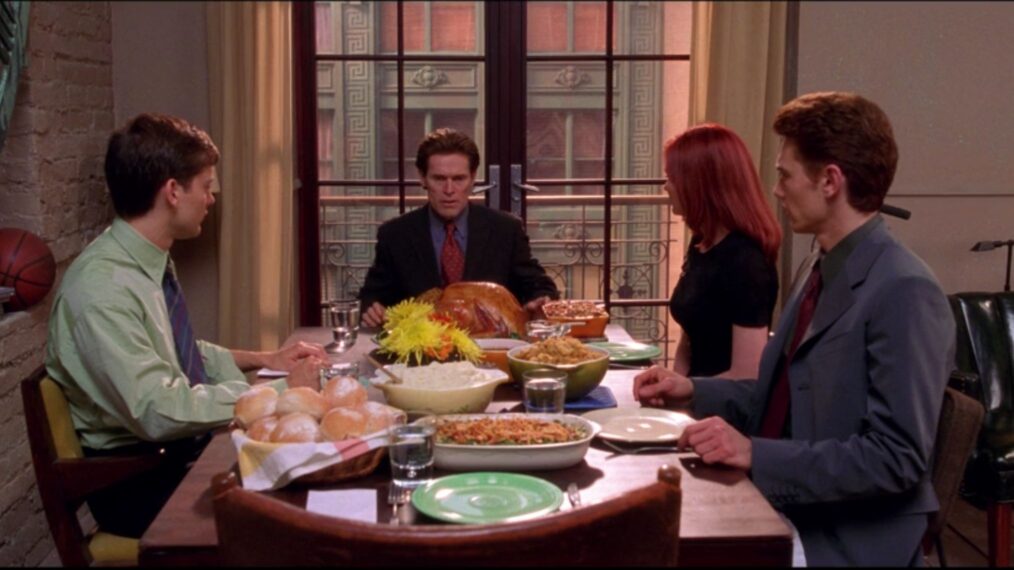Released in a post-9/11 era, 2002’s Spider-Man exuded an optimism almost unparalleled before or since. Fueled by its sincerity and a seasonal backdrop (which may have seemed out of place at its May 2002 release), the movie channels the spirit of Thanksgiving, embodying the themes of faith, goodwill, and unity throughout its duration. It’s just the perfect viewing for Turkey Day.
Sam Raimi‘s Spider-Man came out at the perfect time when an earnest approach to the genre wasn’t cringe. Scenes are always sunny, and the weather only gets bad if our hero is having a bad day. Peter (Tobey Maguire) is an altruistic ray of light, attempting to keep his city just as bright. He doesn’t have to deal with vigilante legislation like Captain America: Civil War or have his heroism questioned like Batman v Superman.
Despite his weighted guilt, he’s out there trying to do the best he can, as optimistically as possible.
Peter got his great power but never heeded the great responsibility part until he lost someone he cherished, Uncle Ben (Cliff Robertson). As Spider-Man, he pursued personal happiness with Mary Jane (Kirsten Dunst) while striving to honor his uncle’s memory, the loss leaving an enduring impact. Only when the safety of everyone dear to him was at risk did he truly appreciate what remained. Expressing gratitude to MJ at the end of the film, he acknowledged his love for her but emphasized thankfulness for her presence in his life and the assurance of her safety.
In stark contrast to the hero’s journey is Norman (Willem Dafoe), an ungrateful businessman despite his thriving success. As a scientist backed by the military, he adamantly rejects going “back to formula” on the concoction that triggered his unhinged alter ego, the Green Goblin. Despite his son’s high school graduation, this divorced father fails to express gratitude, redirecting his praise toward Harry’s (James Franco) best friend, recognizing a reflection of himself in Peter more than his son. He can’t even be happy for Harry and his short-lived courtship with MJ, harkening back to his hatred of women, probably due to his divorce. The parallel between them marks a decisive crossroads, and their divergent choices lead them down separate paths.

Sony
Everything culminates during the Thanksgiving scene, with the two men seated at the table amidst loved ones and a turkey. Even Norman, initially joyful (albeit with a touch of madness when Rosemary Harris‘ Aunt May rebuffs his attempt at the food), experiences a shift when he discovers Pete’s identity as Spider-Man. His Norman persona fades away, and the Goblin emerges. Gratitude evaporates, replaced by a sense of duty. Now is the time to use those loved ones he was surrounded by to enact his revenge on Spider-Man, putting them all in danger along the way.
The era in which the movie was both released and set transports me back to the cultural landscape of America during its initial premiere.
New Yorkers band together to support Spider-Man against the Goblin, disproving the notion (at least temporarily) that the city’s residents would succumb to cynicism and turn against him. Much like the crowd in the film, America, at that time, yearned for a hero, and for youngsters, the arrival of this red, white, and blue superhero symbolized the hope that one day they too could emerge as heroes. Fast forward over two decades as an adult, the realization sets in that a singular hero may not manifest.
However, the film’s enduring optimism continues to serve as a source of inspiration and appreciation for who you have in your life, encouraging audiences to step up and become their own hero or play a heroic role in someone else’s narrative.
Spider-Man (2002), Streaming Now, Netflix, Disney+
